Blog Strengthening Capacity of Extension Officers in Gender-responsive Bean Research, Digital Extension and Agribusiness, in Laikipia and Nyeri Counties, Kenya
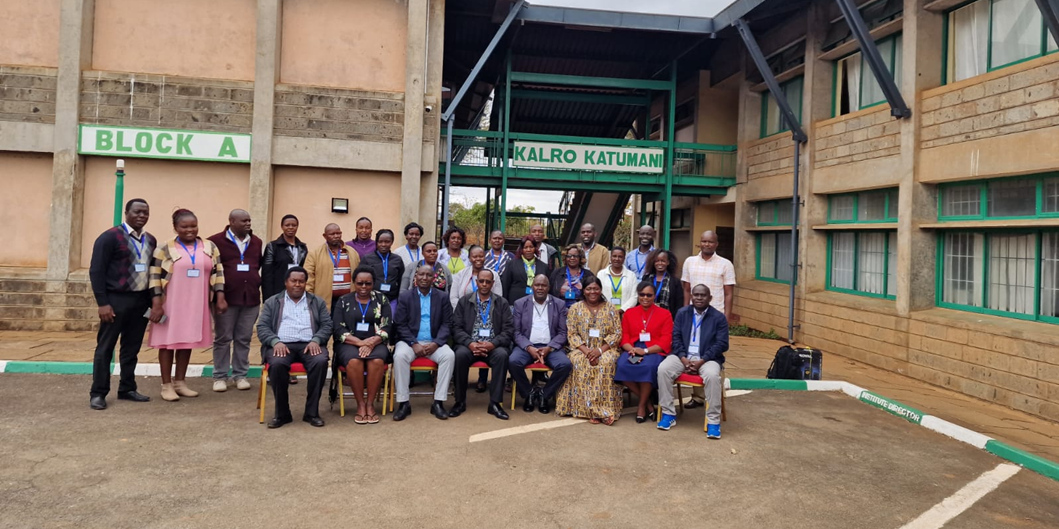
The Kenya Agricultural Livestock Research Organization (KALRO) and the Alliance of Bioversity International and CIAT (ABC), through the Seed Equal Initiative, the Gender Equality Initiative, the Ukama Ustawi (UU): Diversification for Resilient Agri-food in East and Southern Africa organized a two-day training of extension officers from Laikipia and Nyeri counties in Kenya in gender-responsive seed systems, digitalised agribusiness and agronomy.
By: Eileen Nchanji, Karanja David, Boaz Waswa, Paul Aseete, Fadhili Kasubiri, Wincaster Mutuli Vicky Korir and Patrick Ketiem
The training was attended by 16 officers (5 men and 11 women). This was done because a strong and responsive extension system is critical for effective and equitable last-mile delivery of agricultural services, technologies and innovations for increased agricultural production.
Although seed is an integral part of the agri-food system, it is often unavailable and unaffordable to smallholder farmers in rural areas, especially women and vulnerable groups. In addition, the poor extension system of getting seeds and information to farmers remains a drawback to adoption and increased productivity. Further, increased climate variability exposes these vulnerable groups to risks like pests and diseases. This calls for more concerted and focused strategies by researchers and development actors to mitigate these challenges through robust partnerships and training.
While addressing the team, Dr. Patrick Ketiem, the Institute Director, Agricultural Mechanization Research Institute, Katumani, noted that a strong and responsive extension system is critical for an effective and equitable last mile delivery of agricultural services, technologies and innovations for increased agricultural production. He noted that counties remain the major
drivers of agricultural transformations. However, due to the sector's declining human resources and low funding, the desired extension services remain weak and largely inaccessible to most farmers. This has led to decreased agricultural production and increased food and nutrition insecurity risk. Therefore, there is a need to strengthen the capacity of the extension staff and other last-mile agricultural service providers to address the emerging agricultural challenges.
Hon. Wilson Maringa, Chief Officer of Agriculture, Livestock and Aquaculture, Nyeri County, noted that the Kenya Kwanza Government’s Agriculture Strategy objective is increasing food production. He noted that the County has reserved a budget for resilient crops, of which beans are one of them. Beans were selected for their nutritional value - protein, carbohydrates, vitamins, and micronutrients, mainly iron and zinc.
The Kenya Agricultural Livestock Research Organization (KALRO) and the Alliance of Bioversity International and CIAT (ABC), through the Seed Equal Initiative, the Gender Equality Initiative, the Ukama Ustawi (UU): Diversification for Resilient Agri-food in East and Southern Africa organized a two-day training of extension officers from Laikipia and Nyeri counties in Kenya in gender-responsive seed systems, digitalised agribusiness and agronomy. The training was attended by 16 officers (5 men and 11 women).
The training covered diverse topics, among them behavioural change in bean production and marketing, bean varieties and seed systems, good agronomy for beans, pest and disease management, farming beans as a business, gender and inclusion, digital tools for technology dissemination (animations), approaches to extension, among others.
Laikipia and Nyeri counties lie within the Central Rift Valley and Central Kenya. The counties have a huge potential for bean production, although this has not been fully tapped to benefit the farmers and the rural economies. The main challenges to bean production in these counties are inadequate seeds, low adoption of certified seeds, mixes of beans, low prices, delayed payment, and the changing climate resulting in high pests and disease infestation. Issues of gender have not been adequately integrated into their bean value chain planning and implementation.
Madam Elizabeth Mwangi, Chief Officer of Agriculture and Irrigation, Laikipia County, highlighted the importance of developing a successful bean production and marketing model that can be scaled to other parts of the county. She acknowledged that beans mean business as they can be grown in two seasons, are inclusive and can improve farmers’ livelihood.
For the corridor approach to work, we need a mindset change in producing and marketing beans, observed David Karanja, Grain Legume and Bean Leader at KALRO.
He further noted that there is a need to understand which varieties are demanded to determine those in subsistence and those in commercial farming, translating to a co-development of an effective delivery model for seed at planting and grain at harvesting, moving from individual to collective marketing. This calls for all county players to come on board to make the corridor work.
There has been a growth in interest in bean production in Nyeri and Laikipia County following a promotion effort by KALRO and County extension officers. Farmers growing Nyota bean, one of the micronutrient-rich droughts-tolerant bean varieties, have reported yields of up to 8 bags
per acre in Naromoru-Kiamathaga ward in Kieni East, Nyeri County. School feeding is also an entry point for disseminating bean production and marketing information to farmers in these counties. Ten schools in Kieni East, Nyeri County, are supported to grow and consume beans.
In a changing climate, there is a need to build the resilience of the farming systems by adopting climate-smart agriculture at all levels of the bean value chain, noted Boaz Waswa, Soil Fertility Expert at ABC. The participants were trained in identification and management of major pest and diseases of beans. The county extension can help farmers access the right technologies and seasonal climate information to guide production operations.
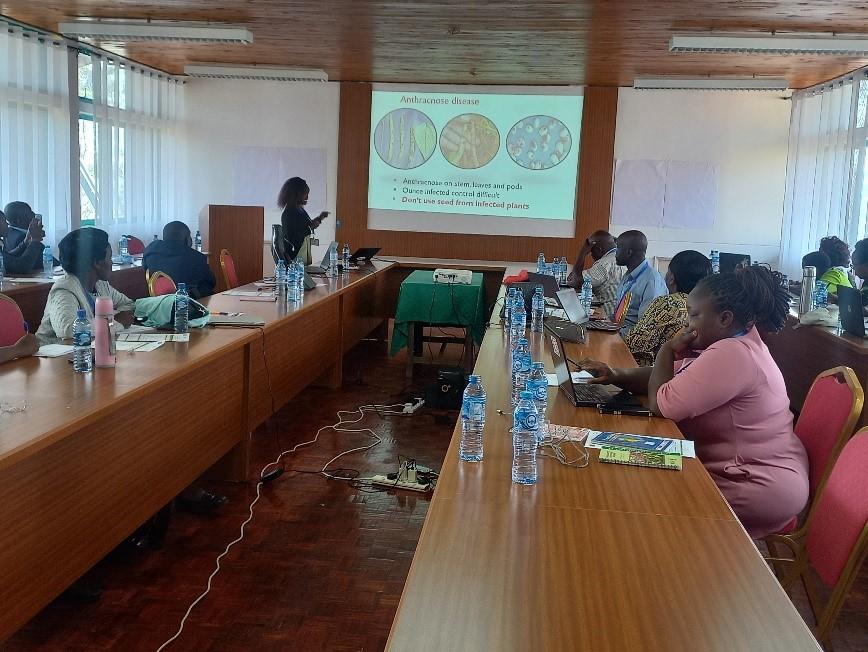
Credit: Eileen Nchanji
As we work on a structured market for beans, we need to understand the cost of bean production and pricing, especially as farmers are linked to markets, noted Paul Aseete, Business Expert at the Seed Equal Initiative.
Using bean production data from the counties, the participants were trained on how to carry out cost-benefit analysis of the bean enterprises. The tool enabled the participants to simulate various scenarios and explore the effect of changes in the cost of inputs, market prices of grain and prices, on overall profitability of the bean production. The different scenarios enable better decision making in farming beans as a business.
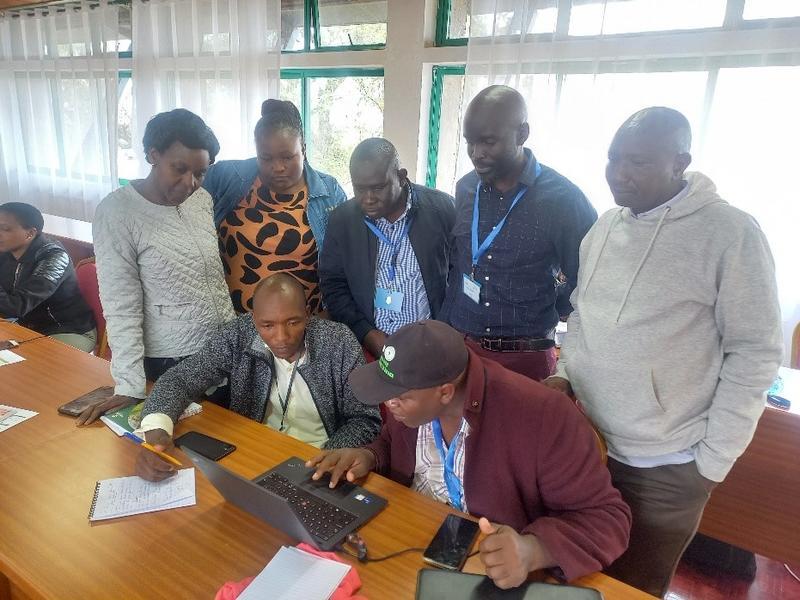
Credit: Eileen Nchanji
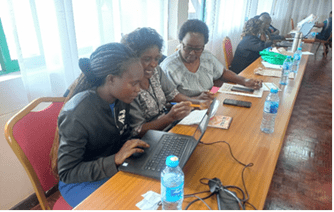
Credit: Eileen Nchanji
Men, women, and youth play different roles along the bean value chain. There is need therefore to be deliberate in integrating gender consideration at all nodes of the bean value chain, noted Eileen Nchanji, Gender Expert, ABC.
The Gender Equality Initiative has developed a framework for monitoring gender. Using such a lens ensures that none of the actors is disadvantaged and that all included, benefit and are empowered. Examples are the seed revolving fund in Kenya, gender-friendly technologies in Kenya and gender-responsive nutrition training in Uganda.
In a technologically changing world, there is a need to adopt innovative extension approaches that take advantage of the digital solutions and which are more visual and interactive. The animations can complement the traditional approaches such as face-to-face, train and visit approaches, brochures, field days and demonstrations. The participants were introduced to Bean Animations developed by the Pan Africa Bean Research Alliance. The animations cover diverse topics on beans such as land preparation, choice of seed, growing beans, post-harvest management, nutrition and school feeding. The animations are available in English, Kiswahili and French. They can be accessed via YouTube, downloaded and played on the phone. A short survey on the appropriateness and usability of the animations will inform continuous improvement of this knowledge and information dissemination approach.
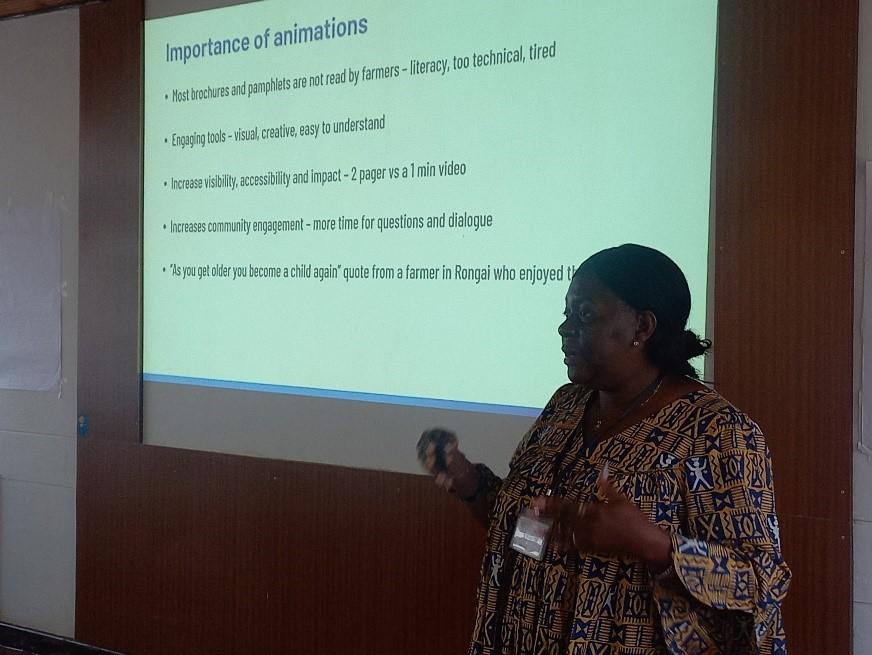
Credit: Eileen Nchanji
Dr Boaz Waswa welcomed the strong collaboration between KALRO, ABC-PABRA and the counties in addressing the extension gaps. This will provide a great opportunity for scaling research technologies and increased bean production. He called for partnerships with more counties and stakeholders to scale inclusive and innovative climate smart technologies and innovations for enhanced food security of the nation. Going forward, the partners committed to strengthening the partnership to scale out micronutrient rich beans production and consumption in Nyeri and Laikipia Counties.
The Team

Nchanji Eileen Bogweh
Gender and Social Inclusion Expert
Boaz S. Waswa
ScientistThis work was carried out with support from the CGIAR, Seed Equal Initiative, Gender Equality Initiative, and Ukama Ustawi (UU): Diversification for Resilient Agri-food in East and Southern Africa and the Kenya Agricultural and Livestock Research Organization, and we would like to thank all the funders who support this research through their contributions to the CGIAR Trust Fund.
